ASX rallies despite Coles, Woolworths drag as inflation beats expectations
Positive signs that Australia has curbed its coronavirus threat helped the ASX to notch its best daily rise in three weeks.
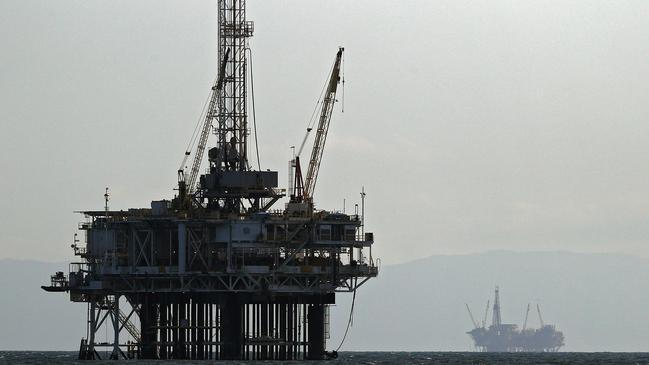
- ASX bounds higher on restart hopes
- Coles posts 13pc supermarket sales jump
- Melco takes $300m loss in Crown selldown
- AP Eagers logistics sale trimmed by 25pc
- CPI jump biggest in 6 years
That’s all from the Trading Day blog for Wednesday, April 29. The ASX jumped to daily highs in the final match to finish the session up 1.5pc, after promising comments from the PM on easing restrictions, and while US oil futures push higher.
Locally, Coles reported a 13pc jump in supermarket sales for the March quarter but said sales were moderating, while Crown backer Melco sold down its stake in the casino group by 9.9pc. March quarter inflation printed at 0.3pc, its biggest jump in six and a half years.
8.15pm: Central banks ‘keeping show on the road’
With unprecedented central bank liquidity driving much of a spectacular bounce in risk assets in recent weeks, the outcome of US Federal Reserve and the European Central Bank meetings on Thursday could have some bearing on whether markets push on or pull back before the weekend.
By effectively backstopping just about every kind of risk in US and European financial markets, the Fed and ECB can take much of the credit for preventing another global financial crisis so far.
Governments have played their part with unprecedented fiscal stimulus and policies designed to prevent severe lockdowns from causing permanent economic damage, though the idea that they can end lockdowns without reigniting the pandemic and extending what may already be the sharpest recession since the 1930s is starting to eclipse the importance of their economic support.
But the opened-ended nature of the central bank stimulus means they have gone all out to avoid a financial crisis occurring on top of a public health crisis which is yet to play out.
Perry Williams 8.05pm: Biomass plant set to power up
The former Redbank coal plant in NSW’s Hunter Valley will be repurposed into a biomass fuels power station, with owner Hunter Energy planning to start supplying energy into the national electricity grid by early next year.
Hunter Energy plans to reuse waste wood products to create a biomass facility with an output of 151MW, enough to power up to 200,000 homes, as it seeks to reboot the former Alinta-owned facility, which closed in 2014.
Although the company had previously held talks with neighbour Yancoal to reuse coal tailings from its Mount Thorley Warkworth mine, the project now plans to operate solely on biomass to qualify for the government’s large scale generation certificates.
7.45pm: China’s Cnooc cuts 2020 capex target by 10pc
Cnooc, one of China’s largest offshore oil and natural gas producers, cut its 2020 capital expenditure target by more than 10 per cent as record-low global oil prices push companies to rework strategies.
The company cut its total capital expenditure target to between 75 billion yuan to 85 billion yuan ($16.25bn-$18.43bn), from an earlier range of CNY85 billion to CNY95 billion.
Cnooc said on Wednesday that it reduced its annual net production target range for 2020 to 505 million barrels of oil equivalent, or BOE, to 515 million BOE, from the previous range of 520 million BOE to 530 million BOE.
The Covid-19 pandemic, which has suppressed demand for local and international travel, has pressured oil companies. They face excess inventories and lower demand for their products, driving oil prices to touch record lows.
“Under the current low oil price environment, the company has adjusted its operating strategy promptly and implemented more prudent investment decision-making to ensure its long-term sustainable development,” Cnooc said.
Dow Jones Newswires
Joyce Moullakis 7.32pm: ASIC on criminal charging spree
An emboldened corporate regulator, drawing on a “why not litigate” policy, assisted in laying an almost fourfold increase in criminal charges to 279 in the six months to December 31.
In its latest enforcement update, the Australian Securities & Investments Commission outlined its case numbers for the latter half of calendar 2019.
It showed it was involved in 17 individuals being charged in criminal proceedings and 279 criminal charges being laid during the six months to December 31, up from 10 individuals and 70 charges in the prior half.
“As I have emphasised over the past year, ASIC has a clear resolve and the Office of Enforcement is delivering on the public’s expectation that we hold wrongdoers to account,” deputy chairman Daniel Crennan said in the report.
The Office of Enforcement was set up in July 2019 after ASIC was lambasted during the Hayne royal commission for not strongly pursuing cases of wrongdoing.
Adam Creighton 7.13pm: ‘Strong’ support for pollie pay cuts
Baby Boomers and middle income families “strongly” want politicians to take a 20 per cent pay cut to share the pain caused by shutdowns, according to nationwide survey.
As millions of workers face the prospect of no job or reduced hours, almost three quarters of households agreed “strongly” or “somewhat” with the proposal “politicians and senior public servants who earn over $150,000 a year” should take a pay cut.
Conducted by polling firm Dynata for the Institute of Public Affairs, the results showed the strongest support for a cut among households earning between $45,000 and $75,000 a year (83 per cent in favour) and those where the head was aged over 65 (85 per cent in favour).
6.57pm: US crude prices higher before data release
US crude prices rebounded higher on Wednesday ahead of US stockpile data. June futures climbed 13 per cent to $US13.89 a barrel, after closing down 3.4 per cent, at $US12.34 a barrel on the New York Mercantile Exchange. Prices briefly spiked to $US13.69 on Tuesday after a report of a bomb explosion on an oil tanker in Syria. The Energy Information Adminstration is due to report supply data later on Wednesday in the US.
Dow Jones Newswires
James Kirby 6.32pm: SMSFs back in fashion
Widespread losses among professional fund managers are set to prompt a resurgence in the self-managed super fund sector, with early numbers already pointing to a rebound.
As the biggest sector in super by value, SMSFs suffered a slowdown in so-called commencements in recent years as a string of new tax rules reduced confidence among self-directed investors.
However, provisional figures for the year to date show that commencements of new funds have bounced back with a powerful 16 per cent lift in newly registered funds for the first two months of the year.
The trend is expected to accelerate, as historical records show the SMSF sector usually gets a new lease of life in the wake of market downturns.
6.06pm: FTSE 100 opens higher as banks gain
The FTSE 100 gained 0.7 per cent at the open as banks rallied following well-received trading updates from Barclays and Standard Chartered. Barclays shares were up 6.1 per cent after the UK lender reported a 20 per cent rise in first-quarter income and said it remained well capitalised to handle the coronavirus crisis.
Asia-focused lender Standard Chartered advanced 5.4 per cent after reporting a better-than-expected 29 per cent drop in first-quarter pre-tax profit and an 11 per cent increase in income.
WPP gained 3.1 per cent after the advertising giant’s first-quarter results beat market forecasts and as it announced further cost cuts.
Energy and mining shares lifted on higher oil and metal prices. Meanwhile, US first-quarter economic growth data and the Federal Reserve’s policy decision are due later.
Dow Jones Newswires
Ben Wilmot 5.56pm: Shopping centre credit quality warning
The listed property sector has been slammed as mall owners struggle to deal with the coronavirus crisis and they could face more pain in coming years, credit agency S&P has warned.
The agency said in a report on the Australian retail, office, and industrial sectors that the earnings and credit quality of Australian REITs will erode over the next year, with shopping centre landlords to be the hardest hit, followed by CBD office markets.
The entire sector is facing a deterioration in financing conditions that could hurt and limit its ability to expand, particularly as companies often tap equity markets to fund their growth.
5.20pm: Surge in screen time boosts chip makers
With much of the world in lockdown, internet users are logging billions of hours of additional screen time as daily life goes virtual.
That increase has seen data centres beef-up their infrastructure to meet demand, a trend that is bolstering the businesses that make components for the servers that store data and power the world’s Zoom calls, Amazon sprees and Netflix binges.
Some of the world’s biggest memory chip makers, South Korea’s Samsung Electronics and SK Hynix and Boise, Idaho-based Micron Technology, say that boost has been welcome in an otherwise challenging environment. At Micron, sales in its February quarter fell but were near the high end of management’s guidance range due partly to data-centre demand. At SK Hynix, average selling prices for some chips rose slightly in the last quarter, pushed by demand for servers.
4.51pm: Staples drag no match for bank strength
Markets were green across all sectors bar health care, utilities and consumer staples after a hit from Coles quarterly results.
The supermarket giant said its grocery sales were up by 13pc for the quarter, but the momentum had lulled in the first weeks of April as panic buying subsided.
Coles shares lost 4.4 per cent to $15.51 while Woolworths dialled back by 2.1 per cent to $36.03 ahead of its trading update.
Elsewhere across the market, financials were back in favour – paring the week’s losses with a 3.9pc boost.
NAB jumped by 6.3 per cent to $16.29, Westpac pushed higher by 5.2 per cent to $15.69 while ANZ put on 6.1 per cent to close at $16.66 ahead of its results to be released on Thursday. Commonwealth Bank rose by 4.2 per cent to $61.07.
Here’s the biggest movers at the close:
4.11pm: ASX bounds higher on restart hopes
Investors were markedly risk-on in Wednesday’s session amid positive signs the local economy was taking steps to ease social distancing restrictions, while strong US earnings and a boost in oil prices added to the uplift.
Shares built solidly through the day to close at daily highs of 5393.4, a gain of 80 points or 1.51 per cent.
Meanwhile, the All Ords added 83 points or 1.53 per cent to 5463.8.
But it was the Aussie dollar that was the clear standout – striding to highs of US65.46c, its best levels since early March. By the close, AUDUSD was up 0.7pc to US65.36c.
Imogen Reid 3.52pm: Aussies on a ‘countdown’ to fewer restrictions
The Deputy Chief Medical Officer Paul Kelly has said Australia is “on a countdown” to easing social distancing restrictions with decisions expected to be made on May 11.
He said the decisions will rely on three precedents, including low case numbers, the ability to respond to outbreaks swiftly, and new laboratory testing, purchased by mining magnate Twiggy Forrest, which will increase case finding ability.
“So over the next few weeks – and as we get closer to that May 11 target and after that as well – there will be many announcements about changes in the way we’ll be living our lives and hopefully getting back to some sort of new normality in lifting in a COVID-19-safe society,” Mr Kelly said.
Read more: PM flags easing of restrictions sooner
3.22pm: Target closure most likely: Citi
The clock is ticking for Wesfarmer’s Target chain, according to analysts at Citi.
Yesterday’s weak trading update for the discount chain adds to pressure on Wesfarmers to reduce the overall size of Target, or close the stores entirely.
Analyst Bryan Raymond tips the closure to be the most likely outcome.
“Given the capital that would be required to sustainably turn Target around and a $1.6 billion lease liability, we view a closure as most likely. Our Target valuation is close to zero, reflecting the near-term losses and costs to exit leases,” he writes, maintaining his Sell rating on the stock.
“The strength of the balance sheet and the acceleration in Bunnings trading to likely double-digit sales growth is supporting the ~23x FY22e normalised price-to-earnings ratio. In our view this reflects a premium for the successful redeployment of capital, which is not justified by Wesfarmers acquisition track record, in our view.”
WES last traded down 1pc to $37.34.
Read more: Bunnings, Officeworks bonanza not shared across Wesfarmers
2.52pm: Super Retail best in the sector: MS
Super Retail presents the best value in the retail sector, with “pent up demand” likely to lift sales once social distancing restrictions ease, according to Morgan Stanley.
The broker rates the stock at overweight, ahead of retail peers JB Hi-Fi and Harvey Norman, saying the electronics retailers will have “a more volatile profile”.
“Relative to peers, we believe Super Retail’s business will be more challenged in the second half, but see a relatively benign profile through FY21 as it is well placed to benefit from pent-up demand following bushfires/social isolation,” analysts write.
More broadly, the broker forecasts nominal consumption declines of 11pc year-on-year for the fourth quarter, and likely to remain negative “until we lap 4QFY20”.
SUL last up 5.5pc at $6.16.
Gerard Cockburn 2.21pm: Maggie Beer lends Longtable $400k
Celebrity cook Maggie Beer has loaned Longtable Group, the owner of her gourmet food line, $400,000 to shore up its liquidity position as demand for its products slip during the pandemic.
The cookbook author and television personality sits on the board of Longtable, after selling the controlling stake of her business last year.
The deal was struck in February 2019 for $8.5m in cash, $1m in Longtable shares and a $500,000 convertible note – which Ms Beer this week redeemed and the majority of which was lent back to the company at an interest rate of 1.7pc, set to expire before July 1, 2021.
In addition, $100,000 in cash from the convertible note was paid to Maggie Beer’s family holdings.
In a statement to the share market this morning, Longtable said it had a combined cash reserves and undrawn debt facilities of $8.1m.
The group said Maggie Beer products experienced a “strong” increase in sales in March, followed by a decline in April, noting that the drop has occurred due to social distancing reducing sales in key entertaining products.
Longtable shares are trading 4.2 per cent down at 11.5 cents per share.
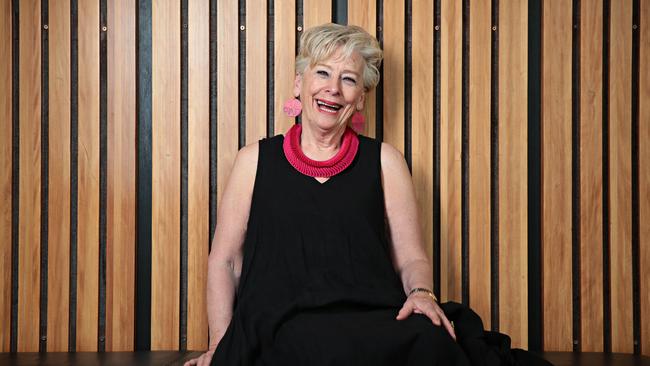
2.03pm: Market mispricing Macquarie risk: MS
Morgan Stanley’s Andrei Stadnik thinks the market is missing the risks to asset realisations as well as impairments in Macquarie Group.
Still, he retains an Overweight rating and $115 price target and says any share price weakness should be a buying opportunity, given it’s the leading alternative asset manager franchise, with renewables growth, strong capital, a track record of resilient earnings and opportunities to deploy dry powder in dislocated markets.
Mr Stadnik says the consensus appears to be looking for Macquarie’s FY20 earnings to fall 5 per cent on year, in line with guidance, but this was issued before the COVID-19 developments.
He expects FY20 earnings 10pc below consensus and FY21 will be 20pc below amid a recession.
1.52pm: Productivity reforms key to recovery: CBA
Economic reforms to address Australias’ lagging productivity will be needed achieve a strong and sustained economic recovery from the COVID-19 recession, according to CBA chief economist, Stephen Halmarick.
He says there needs to be reforms in infrastructure, climate change and energy policy, industrial relations, working arrangements, gender participation and equity, regulation and approvals, housing affordability, tax reform, Federal-State relations, and population policy.
“We would expect to hear much more on this from the Commonwealth government at the 6th October 2020 Budget,” Mr Halmarick says.
1.30pm: China to resume legislative sessions
China will kick off the annual legislative meetings it postponed due to the coronavirus on May 22 in Beijing, state media reported Wednesday.
China’s political consultative body will start its annual meetings on May 21, the Xinhua News Agency said, citing decisions from the Standing Committee of the National People’s Congress, the country’s top legislative body.
Senior officials at China’s national legislature and government advisory body normally meet in early March to outline policy priorities, including economic growth objectives, for the coming year.
Dow Jones Newswires
1.22pm: US oil rebounds by 14pc
US oil prices rebounded above $US14 a barrel Wednesday, a day after a sell-off sparked by a major fund selling its short-term holdings of the commodity amid virus-triggered storage concerns.
West Texas Intermediate, the US benchmark, for June delivery jumped 14.5 per cent to $US14.13 a barrel in Asian morning trade.
It had plunged by more than 21 per cent at one point Tuesday after the United States Oil Fund – a major US exchange-traded fund (ETF) – started selling its short-term contracts of the commodity.
Brent crude, the international benchmark, was trading 3.27 per cent higher at $US21.13 a barrel.
AFP
1.09pm: Lendlease shares higher after placement
Property developer Lendlease is higher by 6.6 per cent on its return to trade, following the completion of its $950m placement.
The group this morning said the offer had received strong demand at the offer rice of $9.80 apiece, with allocation preference given to existing shareholders, then to those with “investment strategies that Lendlease believes are aligned with its business”.
“It strengthens the Group’s balance sheet during an uncertain economic environment and ensures Lendlease is well-positioned to deliver long-term securityholder value, by maintaining a strong financial position with substantial capacity to support the delivery of the Group’s global development pipeline and the next phase of investment for growth,” chief Steve McCann said.
LLC last up 6.55pc at $11.38.
Read more: Lendlease seeks to raise $1.15bn
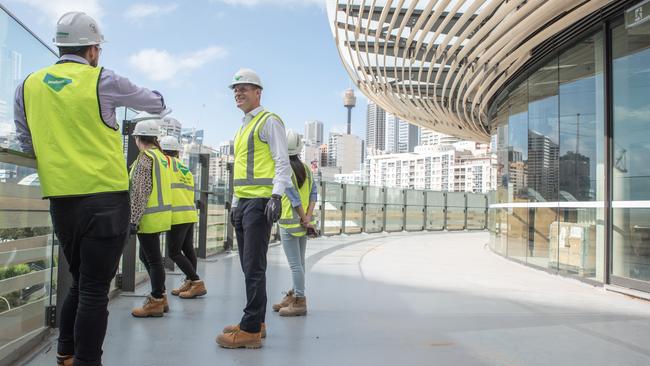
1.02pm: Bank rebound supports ASX lift
The ASX is just shy of its daily highs at lunch, pushing up by 1.2 per cent as supported by outsized gains across the major banks.
All of the big four are notching impressive gains led by a 5.3 per cent jump in NAB.
At 1pm, the ASX200 is up by 67 points or 1.26 per cent to 5380.1.
On the downside, Coles and Woolies are still pulling lower – off by 4.7pc and 2.4pc respectively.
Here’s the biggest movers at 1pm:
12.36pm: CPI boost will be short-lived: economists
Strong headline inflation in the March quarter puts the economy within the RBA’s 2-3pc target band for the first time in almost two years but economists warn the next quarter’s release won’t be pretty.
EY chief economist Jo Masters points out that the firm is tipping the largest economic contraction since the 1930s.
“The impact of the coronavirus will push the annual inflation rate into negative territory for the first negative annual headline CPI rate since the 1960s,” she writes.
“That is the cost of the average basket of goods and services consumed by households will be lower than it was a year earlier.”
NAB’s Kaixin Owyong puts a figure on that decline, tipping a hit of 1.9pc in Q2, “mainly reflecting a sharp fall in petrol prices and the introduction of free childcare that swamps temporarily higher prices on the back of panic buying of essentials”.
Indeed economist Callam Pickering points out that the trend longer term is weak too – “the loss of wages and elevated rate of unemployment may lead to persistently low inflation, even for core inflationary measures … Double digit unemployment and historically low wage growth is a recipe for deflation.”
Read more: Inflation tops 2pc for the first time since 2018
Bridget Carter 12.11pm: Aus Potash raising $4.9m
DataRoom | Australian Potash is raising $4.9m through a placement and an entitlement offer at 5c per share.
The funds are being used to develop the company’s Lake Wells Sulphate of Potash Project.
The raise is at a 35.1 per cent discount to the last closing share price of 7.7c.
11.58am: Aussie dollar hits 7-week high
The renewed risk-on tone for markets is fuelling a rally in the Aussie dollar, helped further by strength in the latest CPI read.
In midday trade, AUDUSD is up by 0.5 per cent to US65.21, after hitting highs of US65.28c.
That’s the best level since March 11.
The current level represents an 18pc lift from lows of US55.07c just over a month ago.
11.44am: CPI jump biggest in 6 years
Australian inflation jumped by 0.3 per cent in the March quarter, ahead of expectations of 0.2pc as drought and bushfires put pressure on prices.
The read is the highest inflation in six and a half years – taking annual inflation to 2.2pc versus expectations of 1.9pc.
“There were some price effects of COVID-19 apparent in the March quarter due to higher purchasing of certain products towards the end of the quarter, as restrictions came into effect,” ABS chief economist Bruce Hockman said.
“Most notably, rises were seen in, other non-durable household products (+3.4 per cent), which includes toilet paper; personal care products (+2.2 per cent), which includes soap and hand sanitiser; and other cereal products (+4.4 per cent), which includes rice and pasta.”
He added that the true impact of COVID-19 would be expected in the June quarter print.
The better-than-expected result has spurred a jump in the Aussie dollar – last up 0.55pc to US65.25c.
Upside surprise for Australian Q1 CPI but food price rise about 2× expected; alcohol & tobacco about same. All other categories pretty much in line with expectations though clothing & footwear did not fall as much. Focus turns to next qtr where risks lie to downside. #ausbiz pic.twitter.com/tbVC7k3MKQ
— Robert Rennie (@Robert__Rennie) April 29, 2020
11.31pm: Hope of easing restrictions adds to positivity
Prime Minister Scott Morrison’s comments that the easing of lockdown restrictions is “not far away” has added to the local rally, pushing shares to a 7-day high of 5354.5.
“Over the next few weeks, markets are going to struggle for direction while the debate over easing lockdown restrictions continues,” says Stephen Innes, chief market strategist at AxiCorp.
“Fundamentally, investors are caught in the same pickle as governments who have to balance the economic risks with the chances of the second round of infections.
“Until there is some way into the easing of lockdown restrictions without the specific risk of a secondary spreader, expect the market to remain stuck in the current range or even possibly a more extensive downside range until the full course of the exit strategies plays out.”
Follow the latest coronavirus updates at our live blog
11.22am: Energy boost spurs ASX uplift
After a rocky open the ASX is now firmly higher, led by a 4.1pc jump in energy stocks.
In the second hour of trade, the ASX200 is now up by 39 points or 0.7 per cent to 5351.9 as US futures lift by 0.7pc.
Interestingly, though, the S&P 500 shied off 2935 points – the 61.8pc Fibonacci retracement of the Feb-Mar fall.
Energy is leading the charge as WTI futures surge by 10 per cent. Woodside is surging by 5.4pc, Oil Search is up by 6.6pc and Santos by 5.2pc.
Financials are also stronger, as consumer staples takes a hit from Woolworths and Coles weakness.
11.17am: Coles high wage costs to persist: Citi
Citi has retained its Neutral rating on Coles after its trading update, saying supermarket sales growth will likely remain elevated while social distancing restrictions remain in place.
The broker points out that sales growth accelerated in the third quarter, but operating leverage was less than normal given the higher staff costs.
“While some of the variable costs associated with higher volumes will subside, the requirement for higher wages attached to cleaning and social distancing requirements will persist,” Citi writes.
“A reduction in promotions has lifted inflation from +0.4pc in 2Q20 to +1.8pc in 3Q20, excluding tobacco and fresh.”
Citi has a $17.60 target price on the stock – which last traded down 3pc to $15.74.
Read more: Panic buying pushes Coles to record
11.06am: Flattening curve a positive for NIB: CS
Australia’s handling of the coronavirus pandemic is a positive for health insurer NIB as a spike in international student and workers claims has likely been avoided, according to Credit Suisse.
The broker today upgrading its rating on NIB to Neutral, saying its initial thesis for the stock was “too pessimistic”.
“The current environment provides an opportunity for the Private Health Insurance industry to manage premiums in a responsible and sustainable manner, with potential to fast-track industry reform,” analysts write.
“Offsetting this for NHF, however, we note ~20pc of earnings remain at risk from an economic slowdown (international and travel insurance divisions).”
The broker still prefers Medibank in the sector as it is a pure-play health insurance name.
NHF shares last up 1.7pc to $4.90 – equal to the broker’s target price.
Lilly Vitorovich 10.33am: Bauer to suspend some print magazines
Bauer Media will temporarily suspend publishing some of its magazines as part of the embattled publisher’s restructuring plans, which will affect up to 140 staff, as the coronavirus crisis wipes out its advertising revenue.
In a brief statement on Wednesday morning, Bauer said that 70 staff will be made redundant and a similar number stood down, just weeks after the group shuttered its operations in New Zealand.
The German family-owned magazine publisher didn’t quantify how many magazines will cease printing. However, they will continue to operate online.
“The decision to resume print publication will be made once the trading environment improves,” Bauer said.
Read more: Jobs go as Bauer halts mags
Bridget Carter 10.26am: Investore raising $NZ100m
DataRoom | Investore Property is raising $NZ100m ($93.5m) though a placement.
Working on the raising is Goldman Sachs.
The company will secure $NZ85m through a placement and $NZ15m through a share purchase plan.
Shares are being sold in a book build at a floor price of $NZ1.59, a 10.2 per cent discount to the last closing share price, up to $NZ1.77.
Bids are taken in 2c increments.
10.19am: Crown shares jump on Melco sale
Crown Resorts shares have jumped 10 per cent in early trading, after Hong Kong billionaire Lawrence Ho sold down a 9.9pc stake in the group to private equity giant Blackstone.
The stake was sold at $8.15 apiece, but shares this morning jumped by 10.7pc to $9.52- its highest levels since the start of March.
Read more: Crown sale end Ho Australian ambitions

10.13am: Shares edge up
Local shares are edging higher to regain yesterday’s losses despite a dip in staples and health care stocks.
At the open, the ASX200 is higher by 7 points or 0.1 per cent at 5320.3.
Coles is a key drag after handing down its third quarter results, investors are seemingly focusing on the group’s warning of slowing sales for the current quarter – sending shares down by 3 per cent to $15.74. Woolworths meanwhile is off by 2.3pc.
But rise in the index has been a bit tepid versus a 0.6pc rise implied by overnight futures relative to fair value.
It’s not building in anything or the prospect of a rise on Wall Street after strong results from Alphabet, which rose 9pc in after-hours trading, pushing Nasdaq futures up 0.8pc while S&P 500 futures rose 0.4pc.
Interestingly enough, after Tuesday’s Asian session sell-off caused by funds rolling to later contracts, June WTI crude futures up 9pc to $13.45 a barrel today.
Energy and Financials are outperforming, but the Consumer Staples, Health Care and Real Estate sectors are underperforming.
Damon Kitney 10.06am: Melco takes $300m loss in Crown selldown
Hong Kong billionaire Lawrence Ho has abandoned his Australian expansion ambitions, this morning selling his 9.9 per cent stake in the James Packer-backed Crown Resorts to global private equity giant Blackstone.
Nearly a year after Mr Ho’s Melco Resorts and Entertainment agreed to pay Mr Packer $1.76 billion for a 19.9 per cent stake in Crown in two tranches, Melco has sold its 9.9 per stake in the Australian gaming group for $8.15 per share, crystallising a loss of more than $300m on its Crown investment.
The exit price compares to the $13 a share Melco paid for 9.9 per cent of Crown in May last year in a deal that reunited Mr Ho and Mr Packer who had previously been business partners, when Mr Ho said he was interested in taking a controlling stake in the group.
Melco’s purchase of a second tranche of Crown shares was put on hold last year after the NSW gambling regulator launched an unprecedented public inquiry into probity issues around Crown and Melco, including whether the share sale breached the terms of Crown’s Sydney casino licence.
Read more: Crown sale end Ho Australian ambitions
Richard Ferguson 9.58am: Twiggy calls for global virus inquiry
Mining billionaire Andrew Forrest has called for a COVID-19 inquiry to only be held after the US presidential elections and says it must not focus solely on China.
Mr Forrest – one of Australia’s richest men – says Scott Morrison should not rush to investigate China’s role in coronavirus as it will be tied up in the agenda of US President Donald Trump, whom Mr Forrest accused of blaming everyone but himself for his country’s coronavirus crisis.
“A COVID-19 inquiry worldwide is common sense but it is not to be a Chinese inquiry/ That would make it instantly political,” he told ABC radio.
“I don’t see what the rush is all about. If this is held after the US presidential election, then let’s just say there’s not going to be a political dog in this fight.
“There’s a bloke in the White House who really wants to stay there and he’s pushing blame as fast as he possibly can from anywhere else but himself. And I don’t think this should be politically orientated.”
Follow all the latest coronavirus updates at our live blog
9.50am: Lynas extends halt at Malaysian plant
Rare earths miner Lynas will keep its Malaysian operations under care and maintenance as the country’s authorities extend their movement control orders to stop the spread of coronavirus.
The halt has been in place since 23 March, and the miner has lodged applications for an exemption on the grounds that it is an essential industry.
“Lynas Malaysia has already implemented strict health and hygiene protocols that meet and exceed the Ministry of Health’s requirements, while we await the government’s decision on our application for approval to restart operations,” it said today.
“Products produced at the Lynas Malaysia plant are essential to the manufacturing supply chains for critical industries including automotive, medical devices (including ventilators), oil refining and machinery and equipment.”
Read more: US military to fund Lynas plant proposal
9.27am: Strong US results to help local shares
Expectations of a rise in Australian shares should be reinforced by the prospect of renewed strength on Wall Street.
Alphabet, the parent company of Google, rose 9pc in after-hours trading after beating Bloomberg’s consensus 1Q EPS estimate by 4.2pc.
The group’s shares had fallen 3.3pc in the ordinary session as the high growth FANG stocks fell 2.8pc ahead of results from Alphabet and heavyweight Apple, Facebook and Amazon.
Together with falls in Health Care and Communications, a sell-off in the heavyweight IT sector saw the S&P 500 close down 0.5pc after opening up 1.5pc. But investors were switching from defensive growth stocks to cyclicals including Energy, Materials, Industrials and Financials, amid optimism about economic reopening.
Despite bleak US economic data including plunging consumer confidence and dire Richmond Fed survey for April, the Russell 2000 index rose 1.3pc, the Euro Stoxx 50 index rose 1.7pc and the Australian dollar hit a 7-week high of 0.6514.
Announcements from France, Spain and Greece about gradually lifting lockdowns from next month helped market sentiment, as did a bounce in crude oil with June Brent crude futures up 2.4pc to $US20.46.
On the charts, the S&P/ASX 200 is getting pulled higher by global markets, but remains vulnerable to a renewed sell-off while below the April peak at 5563.6.
9.12am: What’s on the broker radar?
- Atlas Arteria raised to Buy – Goldmans
- Auckland Airport raised to Neutral – Goldmans
- Brickworks raised to Buy – Citi
- Lendlease target price cut 37pc to $15.67 – Citi
- Mayne Pharma rated new Buy – Canaccord
- NIB raised to Neutral – Credit Suisse
- Northern Star cut to Neutral – Macquarie
- Perseus Mining cut to Neutral – Macquarie
- Saracen Minerals cut to Hold – Jefferies
- Sonic Healthcare cut to Sell – Morningstar
- Sydney Airport raised to Buy – Goldmans
- Technology One cut to Neutral – Macquarie
- Westpac raised to Buy – Bell Potter
9.06am: Iluka pares zircon output
Iluka Resources said it would pare zircon output in response to uncertainty created by the coronavirus pandemic, as it laid bare the impact of earlier shutdowns of China’s ceramics industry.
Iluka said it has altered production settings at its Narngulu mineral separation plant in Western Australia to reduce zircon production.
“If the new production settings remain in place for the remainder of the year, zircon production would be approximately 170,000 tonnes,” Iluka said. That would represent a reduction of 110,000 tonnes compared to earlier guidance, which has withdrawn on April 9.
Iluka reported zircon production of 50,100 tonnes in the three months through March, its fiscal first quarter.
Sales were down 62pc compared to a year earlier, mainly reflecting ceramic industry shutdowns in China that lasted through February to the middle of March.
Overall mineral sands output, excluding ilmenite, totalled 152,600 tonnes and was down 16pc on the final quarter of 2019.
Dow Jones Newswires
Bridget Carter 9.04am: Credit Corp raising $150m
DataRoom | Credit Corp has announced it is raising $150m.
The company plans to secure $120m through a placement and $30m through
a share purchase plan.
Shares are being sold at $12.50 each, an 11.6 per cent discount to the last closing price of $14.14.
Funds will pay down debt and strengthen the company’s balance sheet, with gearing at about 10 per cent.
Working on the raising is JPMorgan
Eli Greenblat 8.58am: Coles supermarket sales jump 13pc
Coles has recorded its strongest ever growth in the key retail metric of same-store sales during the third quarter. Comparable sales growth for the quarter was up by 13.1 per cent, driven by panic buying in the wake of the coronavirus pandemic.
But the supermarket continued to record subdued trading for its liquor stores coming out of the bushfires in early January, as well as depressed petrol sales volumes as Australians remained locked up at home because of isolation measures.
The double-digit sales leap in the third quarter was almost double the previous high of 7.3 per cent growth for the fourth quarter of 2009.
The lift in supermarket sales was boosted by cooking ingredients, helped by consumers staying at home rather than eating out, and the success of the new TV series of MasterChef, which together encouraged more shoppers to try their hand at home cooking.
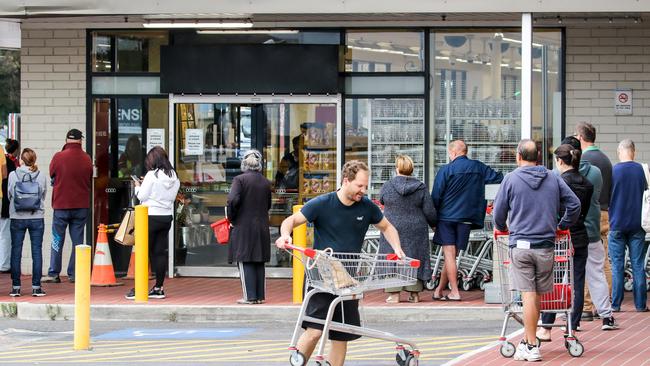
8.49am: AP Eagers discounts refrigerated logistics
AP Eagers has renegotiated the terms of its refrigerated logistics sale, taking a haircut of 25 per cent on the sale price as it blamed “broader market impacts as a result of COVID-19”.
The car retailer made an agreement with Anchorage Capital Partners to sell the division in February, but the proceeding downturn forced the two to reconsider certain conditions, including the price of the sale.
In a notice to the market, AP Eagers said Anchorage had agreed to waive certain conditions, but the cash proceeds on the deal’s completion would be trimmed to $75m from $100m.
“Completion of the transaction is now expected to occur on 30 June 2020 and is not subject to any outstanding conditions precedent that are within Anchorage’s control,” AP Eagers said.
“These steps allow AP Eagers to meet its objective to divest the Refrigerated Logistics division as soon as commercially possible at a reasonable price, and provide greater certainty about timing of the divestment.”
Read more: Anchorage Capital goes ahead with AHG logistics purchase
Jared Lynch 8.30am: A2 chair in $34m share sale
British tax rules have forced A2 Milk chairman David Hearn to sell 1.8m shares for a total value of $NZ37m ($34.5m) as the company’s stock rockets on higher-than-expected sales of infant formula.
Mr Hearn exercised 3.1 million options this week that A2 granted him in 2015 when its shares were trading at 51c, a far cry from today’s price of $18.93. Those options needed to be exercised before June 30 this year to avoid them lapsing.
On exercising those options Mr Hearn, who is a UK tax resident, faced a tax bill of more than 50 per cent, given British tax liabilities arise on the exercise of options, rather than vesting of those options or the sale of ordinary shares.
A2 said in a statement to the ASX that Mr Hearn was required to pay his UK tax bill “within a short period of time following the exercise of the options”.
Mr Hearn continues to hold 1.3m A2 shares, worth about $NZ26m.
Eli Greenblat 8.20am: Kern quits Kaufland board
Julia Kern, the 29-year-old wunderkind sent from Germany to launch supermarket chain Kaufland in Australia, has resigned as a director as the business enters the final stage of its complete exit.
Ms Kern was a rising star within the German-based Kaufland group when handed the keys to the planned Australian operations, with orders to open the first Kaufland store and then expand to as many as 20 stores in a few short years.
But in January all those plans were binned when Ms Kern was forced to tell her staff that Kaufland had changed its mind and that the German hypermarket would not be opening in Australia. It said it would shut down all its administrative and planning operations and exit in March or April. This saw her forced to make her 200 staff redundant.
Documents lodged with the Australian Securities and Investments Commission show that now Ms Kern has resigned as a director of Kaufland Australia.
This week The Australian reported that Kaufland Australia two other directors, Mark Hewlett and Maximilian Wiedmann, had also resigned their directorships of the local arm of Kaufland.
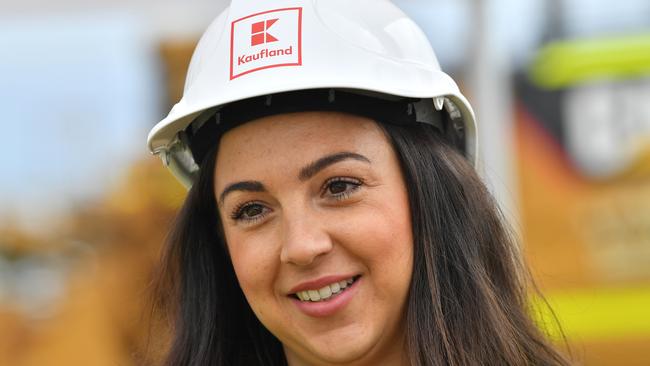
7.35am: ASX set for modest early gain
The Australian share market is on track for minor gains but will battle a weak lead from Wall Street, after US investors pulled their money out of market-leading stocks and moved to cyclical value ones.
At 7am (AEST) the Australian SPI 200 futures contract was up 20.0 points, or 0.38 per cent, to 5,325.0 points.
The major US indices fell overnight as investors shift to stocks that stand to benefit more from the easing of coronavirus pandemic restrictions, as US states try to restart the economy.
The benchmark S&P/ASX200 index also finished lower on Tuesday. It fell 8.3 points, or 0.16 per cent, to 5,313.1 points.
The All Ordinaries closed down 7.1 points, or 0.13 per cent, at 5,381.2 points.
One Australian dollar buys US64.91 cents at 7am (AEST), up from US64.82 cents at Tuesday’s close.
The price of gold is $US1,707.46 an ounce.
AAP
7.20am: Oil prices end lower
Oil prices whipsawed on their way to ending lower as investors and index funds rushed out of near-term futures contracts for fear that the financial instruments may repeat last week’s plunge into negative territory.
The world is awash with too much oil as coronavirus lockdowns on driving, flying and industrial activity have all but eliminated the need for the stuff.
That has commodity investors eschewing oil in the near term and pushing out their exposure to prices later in the year in hopes that swathes of the economy will be reopened then and normal fuel consumption will resume.
June futures contracts for West Texas Intermediate — the main U.S. bellwether — dropped nearly 20pc to $US10.24 a barrel in early trading before shooting up to around $US13.56 a barrel, or 6pc above Monday’s close, after President Trump tweeted his approval of Texas’s plan to reopen businesses.
The price rise was short lived, though, and the June contract resumed its slide by late morning. It ended Tuesday down 3.44pc at $US12.34 a barrel. Later-dated futures contracts bounced between gains and losses in erratic trading.
Brent crude moved around in a more narrow band, ending up 2.35pc to $US20.46 a barrel. The global benchmark is trading at such a big difference to WTI because of severe bottlenecks in storing oil in Cushing, Okla., where the U.S. contracts are settled. Brent is mostly seaborne, so it isn’t prone to the same pipeline and storage issues.
Dow Jones
7.10am: Inflation growth tipped short-lived
Economists are tipping a stronger March quarter inflation print to be short-lived as coronavirus-related supply and demand shocks filter through, most notably a decline in holiday travel, fuel prices, house prices and rents.
Consumer Price Index data to be released by the Australian Bureau of Statistics on Wednesday is expected to show a headline rise of 0.2 per cent for Q1 – slowing from 0.7 per cent growth in December.
Year-through inflation should grow from 1.8 per cent to 1.9 per cent. However, a collapse in oil prices, combined with the introduction of free childcare and the deferral or reduction in some price increases, means year-ended headline inflation to June will likely turn negative for the first time since the 1960s.
RBA governor Philip Lowe indicated as much in the central bank’s economic update last week.
JP Morgan’s Ben Jarman and Tom Kennedy noted the expected March inflation figures had already been marked down considerably since the start of the year on the back of COVID-19-related supply and demand shocks.
National fuel prices ended the January-March period down 6.0 per cent quarter- on-quarter – equivalent to 0.2 percentage points of first quarter CPI – with the depreciation in the Aussie dollar offsetting some of the fall in global energy prices.
AAP
6.55am: Starbucks sales sink
Starbucks said its global sales plunged in the first three months of the year as coronavirus-related shutdowns crippled its global operations.
The Seattle-based coffee giant said 98pc of its stores in China have reopened, but many are operating with reduced hours and seating. In the U.S., the company has temporarily closed half of its 8000 company-owned stores, while 75pc of stores in the United Kingdom, Japan and Canada are shuttered.
The company said sales at its established stores fell 10pc in the January-March period. It expects conditions to worsen in its fiscal third quarter before moderating later this year. It said it is withdrawing most 2020 financial guidance as a result.
Starbucks’ revenue fell 5pc to $US6 billion in its fiscal second quarter. That beat analysts’ estimate of $US5.9 billion, according to FactSet.
The company earned $US328.4 million for the quarter, down 50.5pc from the prior year.
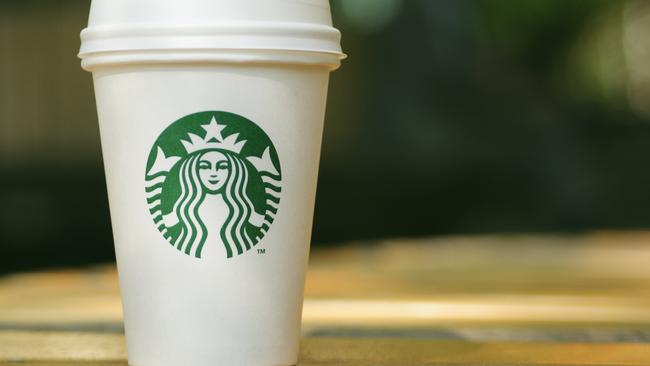
AP
6.45am: Ford reports $US2bn loss
Ford Motor reported a larger pretax loss, adjusted for one-time items, than the company was expecting and said that number is expected to top $US5 billion in the current quarter.
Ford said its first-quarter adjusted loss before taxes was $US632 million and that the COVID-19 pandemic negatively impacted results in the first quarter by at least $US2 billion. The automaker said earlier this month it expected that earnings metric to be around $US600 million for the first quarter and for revenue to slip 16pc.
Ford overall reported a net loss of $US1.99 billion, or 50 cents a share, and revenue of $US34.32 billion, which was down 15pc from a year ago. According to FactSet, analysts expected a loss of 8 cents a share and $US34.69 billion of revenue.
Car production was halted last month and demand in the industry has slowed, but The Wall Street Journal this week reported that major car manufacturers, including Ford, are planning to partly reopen factory production in the U.S. starting May 18.
The pandemic forced Ford to close its European and U.S. factories last month.
Dow Jones Newswires
6.40am: Google growth slows
Google has reported its weakest revenue growth in nearly five years in the first quarter as the pandemic-driven recession began to shrivel its advertising sales.
The January-March earnings for Google parent Alphabet offer a first look at how the digital ad market has fared amid widespread orders requiring consumers to stay at home. Those restrictions have given most advertisers little incentive to market their products and services.
It’s an incomplete picture because ad demand in most parts of the world wasn’t hit hard until late February and early March. That’s when the coronavirus outbreak accelerated and governments imposed lockdowns to fight it.
Alphabet’s first-quarter revenue increased 13 per cent from the same time last year to $US41.2 billion ($63.4 billion).
While most companies would celebrate that kind of growth, it’s a significant slowdown for Google, which has regularly generated quarterly revenue gains of 20 per cent to 25 per cent.
The company’s revenue growth hasn’t been this low since the northern summer of 2015. That was before Google created Alphabet as a new holding company for itself and a hodgepodge of more risky tech ventures.
The performance was still slightly better than revenue of $US40.8 billion projected by analysts surveyed by FactSet Research.
Alphabet earned $US6.8 billion during the quarter, a 2.0 per cent increase from last year. The company’s stock climbed 3.0 per cent to $US1,269.50 in extended trading.
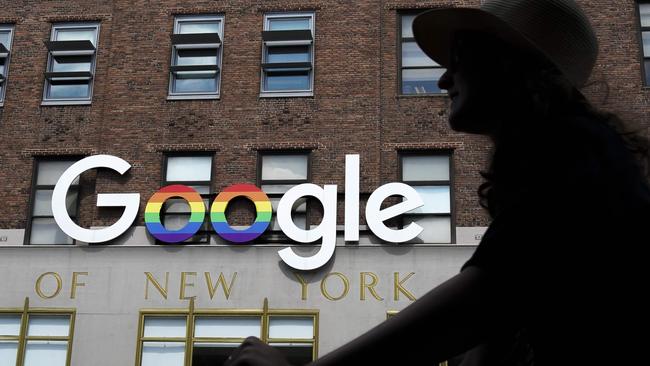
AP
6.10am: US stocks tick lower
US stocks finished modestly lower as more states prepared to relax coronavirus-containment measures, though a resurgence of economically-sensitive shares suggested growing optimism among investors about the path forward.
The S&P 500 slipped 0.5 per cent, as declines in technology and healthcare stocks, which have the smallest losses year-to-date of the 11 sectors, weighed against gains in the harder-hit energy, financial and industrial groups.
“As states start to reopen their economies, I think those segments of the market that are more levered to economic growth, things like small-cap, banks, energy, seem to all be starting to lead a little bit,” said John Zaller, chief investment officer of MAI Capital Management. “I think that’s a good sign for the overall market recovery, that it’s not just the megacap growth companies dominating the market.”
The Dow Jones Industrial Average down 0.1 per cent, while the tech-heavy Nasdaq Composite dropped 1.4 per cent.
After closing flat yesterday following a volatile session, the ASX is poised to open modestly higher. At 6am (AEST) the SPI futures index was up 14 points, or 0.3 per cent.
Shares of smaller companies, which tend to be more exposed than larger firms to economic growth or weakness, also outperformed, with the Russell 2000 index adding 1.8 per cent.
In commodities, US crude prices dropped 1.3 per cent to $US12.62 a barrel and are down 79 per cent in 2020.
“I’m not sure we’ve seen the last of oil prices going lower,” said Bhanu Baweja, chief strategist at UBS Group. Sliding oil markets will likely prompt further declines in shares of banks as well as energy companies, Mr Baweja said. That is because lower oil prices will pull down inflation expectations and longer-term bond yields, acting as a drag on banks’ profitability.
Elsewhere, the Stoxx Europe 600 index rose 1.7 per cent. In Asia, Hong Kong’s Hang Seng index rose 1.2 per cent while Japan’s Nikkei 225 index ended the day largely flat.
Dow Jones Newswires
5.50am: Air cargo warning
The global aviation industry warned of a severe cargo capacity shortage as airlines around the world slash jobs and suffer plunges in profits due to the coronavirus crisis.
The International Air Transport Association (IATA) said the March air cargo data showed a sharp capacity shortfall, with volumes down 15 per cent but capacity down by more than a fifth.
IATA said global demand, measured in cargo tonne kilometres (CTKs), fell by 15.2 per cent in March compared to 12 months previously, while global capacity, in available CTKs, shrank by 22.7 per cent.
“At present, we don’t have enough capacity to meet the remaining demand for air cargo,” IATA chief executive Alexandre de Juniac said in a statement.
“The gap must be addressed quickly because vital supplies must get to where they are needed most.” He said there had been a doubling of demand for pharmaceutical shipments during the pandemics, but most of the passenger fleet was sitting idle.
AFP
5.45am: BA warns of job cuts
British Airways-owner IAG has reported a big loss in the first quarter and warned it may cut up to 12,000 jobs in sweeping restructuring measures aimed at weathering the crisis inflicted on the airline industry from the coronavirus.
First-quarter operating losses before exceptional items were 535 million euros ($A896 million) compared with a profit of 135 million euros a year ago as revenue dropped 13 per cent to 4.6 billion euros.
Pre-tax profits were hit by an exceptional charge of 1.3 billion euros due to overhedging of its fuel and foreign currency needs for the rest of 2020, it said.
Echoing comments from its rivals, the airline said in a statement it will take several years for passenger demand to return to 2019 levels.
“British Airways is formally notifying its trade unions about a proposed restructuring and redundancy program,” the statement added. “The proposals remain subject to consultation but it is likely that they will affect most of British Airways’ employees and may result in the redundancy of up to 12,000 of them.”
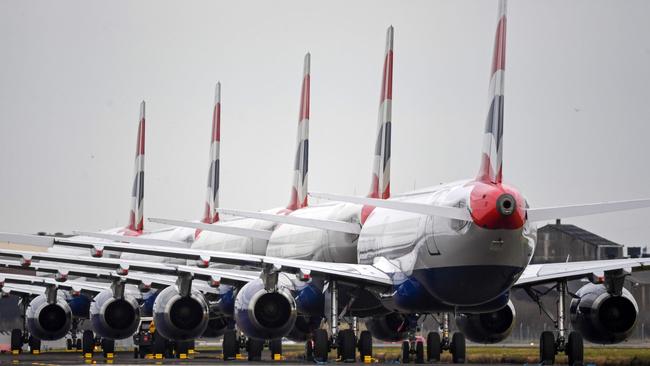
Reuters
5.40am: Markets rally as lockdowns ease
World stock markets rallied on moves to ease coronavirus lockdown measures, though US oil prices struggled to keep above $US10 per barrel.
Equities rebounded as several nations began to ease lockdowns, with some light at the end of the tunnel after weeks of volatility caused by the COVID-19 pandemic.
Unveiling a scaling down of restrictions from May 11, French Prime Minister Edouard Philippe notably said that shops could reopen on that date although people who can work from home should continue to do so.
New York’s West Texas Intermediate oil tanked more than 21 per cent to $US10.07 after a major US exchange-traded fund started selling its short-term contracts of the commodity — albeit swiftly recovering past $12.
“There is a growing sense of optimism the lockdowns have helped contain COVID-19,” said David Madden, market analyst at CMC Markets UK, saying dealers saw this a reason to be “bullish.”
Chris Beauchamp, analyst at trading firm IG, said that in extraordinary times “the focus is on the slow but steady move out of tight lockdown policies across the globe.”
Overall, equities have been buoyed in recent days by news that some of the worst-hit countries are finally seeing infection and death rates slow to levels not seen for a month.
At the same time, profit-taking and concern that some containment measures could be lifted too soon — leading to a possible second wave of infections — are tempering any surge across markets.
Those concerns were highlighted by data out of Germany on Tuesday showing a slight pick-up in transmission just as the country was beginning to open up.
London closed up 1.9 per cent, Frankfurt gained 1.3 per cent and Paris rose 1.4 per cent.
AFP
5.37am: US consumer confidence plunges
Fear of the coronavirus pandemic sent US consumer confidence falling by a massive amount in April, a survey said Tuesday, but consumers remained somewhat optimistic about the future.
The results of The Conference Board’s latest Consumer Confidence Index were slightly better than expected but nonetheless indicative of the damage done by the pandemic in the United States, which is home to the world’s largest coronavirus outbreak.
The index dropped to 86.9 in April from the downwardly revised 118.8 in March, when consumers were already nervous over the virus.
The previous month’s survey was taken only halfway through March, and April’s is the first to capture the full effects of the pandemic that has shuttered businesses, led to tens of millions of lay-offs and forced people to stay inside to stop the virus’s spread.
The survey’s Present Situation Index, which measures consumers’ assessments of the current economic and labour conditions, posted its largest-ever drop from 166.7 in March to 76.4 in April.
The survey found 45.2 per cent of participants felt business conditions were “bad,” up from 11.7 per cent in March, with only 20.8 per cent saying conditions were “good.” “The 90-point drop in the Present Situation Index, the largest on record, reflects the sharp contraction in economic activity and surge in unemployment claims brought about by the COVID-19 crisis,” said Lynn Franco, senior director of economic indicators at The Conference Board.
AFP
5.35am: Merck expects brunt of pandemic to come
The pandemic increased sales of Merck medicines during the first quarter as households around the world stocked up, but the drugmaker expects a significant hit this quarter as the full force of the outbreak lands.
Merck & Co. anticipates 2020 prescription drug sales will fall by $US1.7 billion because the pandemic is keeping many patients with chronic conditions away from their doctors. About two-thirds of Merck’s medicine sales are for injected drugs administered by a doctor, from its blockbuster Keytruda and its portfolio of vaccines, to birth control implant Implanon and an anaesthetic used in surgical procedures.
The company lowered its outlook for the year Tuesday despite an 11pc revenue jump and a profit increase of 10% in the most recent quarter.
It expects sales of its veterinary medicines to dip by $US400 million.
AP
5.30am: Southwest posts quarterly loss
Southwest Airlines posted its first quarterly loss in nearly a decade and said the downturn in air travel that began in late February shows no signs of letting up.
Cancellations have eased from a peak in March, but remain at levels that Southwest has never experienced.
Southwest doesn’t fly to Asia, where the pandemic originated, and so it felt its effects later than rivals Delta, United and American. However, with U.S. air travel now down about 95pc from a year ago, all the carriers are navigating the same storm.
Southwest expects revenue to drop by 90pc to 95pc this month, compared with last April.
“The U.S. economy has been at a standstill, and the current outlook for second quarter 2020 indicates no material improvement in air travel trends,” Chairman and CEO Gary Kelly said in a written statement.
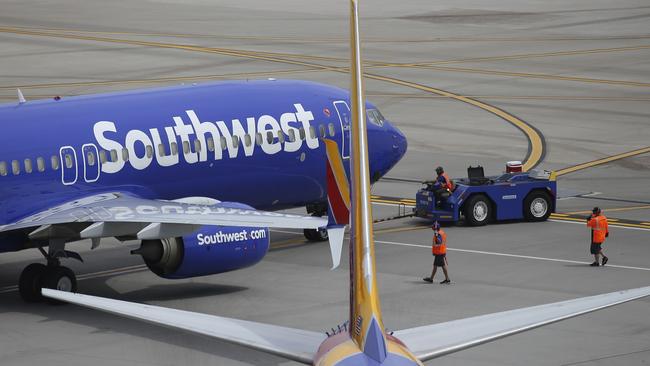
Kelly told employees a few days ago that passenger traffic was “virtually zero,” that the airline was burning through cash at an alarming rate. Kelly told employees that Southwest must prepare to become “a drastically smaller airliner” if travel doesn’t improve by July, a stunning declaration coming from the head of an airline that has never laid off employees in 49 years of flying.
But the Dallas airline has also never reported an annual loss, a streak that most believe will come to an end this year. It’s cancelled thousands of flights, grounded much of its fleet, and negotiated for $US3.2 billion in federal aid to help cover payroll costs through September. It’s asked employees to take unpaid time off.
Southwest swung to a first-quarter loss of $US94 million, from a $US387 million profit in the same period last year. The airline last reported a quarterly loss in September 2011.
AP
5.28am: Pfizer sees mixed COVID-19 impact
Pfizer reaffirmed its 2020 profit forecast following solid results that showed a mixed effect of the COVID-19 crisis on medical product sales.
Revenues at the pharmaceutical giant were dented by the halt to non-essential surgeries, and Pfizer also ceased in-person meetings with healthcare professionals in many markets, impeding prescriptions of some new drugs.
But Pfizer also pointed to increased sales of drugs stemming from consumers seeking to avoid pharmaceutical visits. Some products also got a boost from their apparent use to treat COVID-19, even though they have not been approved for that use, the company said.
Net income came in at $US3.4 billion, 12 per cent below last year, which translated into per-share results that topped analyst expectations.
Revenues declined eight per cent to $US12.0 billion.
Pfizer confirmed its full-year forecasts for revenues and adjusted profits, while tweaking a number of other aspects of its outlook.
It also said it faces no liquidity problems for “the foreseeable future.”
AFP
5.25am: Caterpillar profit tumbles
Caterpillar’s profits are down 46pc with much of the global economy seized by the spread of the coronavirus pandemic.
The company has already withdrawn all financial guidance and said it expects that the outbreak will skew its performance throughout the year. The heavy mining and construction equipment builder has been deemed essential by a number of central governments in maintaining infrastructure, and it’s implemented new safety protocols to continue operations.
About 75pc of its primary production facilities continue to operate as of mid- April.
Caterpillar Inc. earned $US1.09 billion, or $US1.98 per share, for the three months ended March 31. A year earlier it earned $US1.88 billion, or $US3.25 per share.
AP
5.20am: BP posts $US4.4bn quarterly loss
British energy giant BP said it slumped into a $US4.4-billion net loss in the first quarter as the coronavirus pandemic crushed demand for oil, triggering a price crash.
“Our industry has been hit by supply and demand shocks on a scale never seen before,” BP’s new chief executive Bernard Looney said in an earnings statement, having seen crude prices plunge from around $US70 per barrel at the start of the year to close to $US10 currently. He confirmed there would be job losses.
“The economic impact of the COVID-19 pandemic coupled with pre-existing supply and demand factors have resulted in an exceptionally challenged commodity environment,” BP said, having reported profit after tax of $US2.9 billion in the first-quarter of 2019.
BP said it planned to reduce cash costs by $US2.5 billion by the end of 2021 relative to 2019.
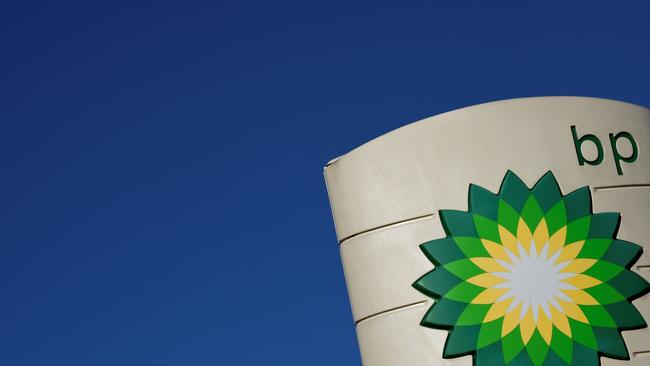
AFP



To join the conversation, please log in. Don't have an account? Register
Join the conversation, you are commenting as Logout